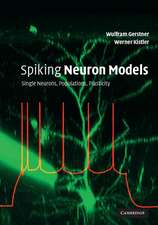Diabetes, Insulin and Alzheimer's Disease: Research and Perspectives in Alzheimer's Disease
Editat de Suzanne Craften Limba Engleză Paperback – 4 mai 2012
| Toate formatele și edițiile | Preț | Express |
|---|---|---|
| Paperback (1) | 941.82 lei 6-8 săpt. | |
| Springer Berlin, Heidelberg – 4 mai 2012 | 941.82 lei 6-8 săpt. | |
| Hardback (1) | 948.92 lei 6-8 săpt. | |
| Springer Berlin, Heidelberg – 5 mar 2010 | 948.92 lei 6-8 săpt. |
Din seria Research and Perspectives in Alzheimer's Disease
- 18%
 Preț: 943.57 lei
Preț: 943.57 lei - 18%
 Preț: 1833.48 lei
Preț: 1833.48 lei - 18%
 Preț: 943.73 lei
Preț: 943.73 lei - 5%
 Preț: 1094.80 lei
Preț: 1094.80 lei - 18%
 Preț: 957.13 lei
Preț: 957.13 lei - 24%
 Preț: 1035.49 lei
Preț: 1035.49 lei - 18%
 Preț: 1216.48 lei
Preț: 1216.48 lei - 18%
 Preț: 1211.74 lei
Preț: 1211.74 lei - 18%
 Preț: 937.58 lei
Preț: 937.58 lei - 5%
 Preț: 707.33 lei
Preț: 707.33 lei - 5%
 Preț: 716.09 lei
Preț: 716.09 lei - 5%
 Preț: 711.32 lei
Preț: 711.32 lei - 15%
 Preț: 636.30 lei
Preț: 636.30 lei - 5%
 Preț: 707.86 lei
Preț: 707.86 lei - 5%
 Preț: 712.60 lei
Preț: 712.60 lei - 5%
 Preț: 711.52 lei
Preț: 711.52 lei - 5%
 Preț: 712.25 lei
Preț: 712.25 lei - 15%
 Preț: 631.86 lei
Preț: 631.86 lei - 5%
 Preț: 707.50 lei
Preț: 707.50 lei - 15%
 Preț: 639.08 lei
Preț: 639.08 lei - 18%
 Preț: 938.51 lei
Preț: 938.51 lei - 5%
 Preț: 365.99 lei
Preț: 365.99 lei - 15%
 Preț: 636.30 lei
Preț: 636.30 lei - 5%
 Preț: 367.84 lei
Preț: 367.84 lei - 15%
 Preț: 635.80 lei
Preț: 635.80 lei - 18%
 Preț: 1211.90 lei
Preț: 1211.90 lei
Preț: 941.82 lei
Preț vechi: 1148.56 lei
-18% Nou
Puncte Express: 1413
Preț estimativ în valută:
180.22€ • 192.71$ • 150.26£
180.22€ • 192.71$ • 150.26£
Carte tipărită la comandă
Livrare economică 17 aprilie-01 mai
Preluare comenzi: 021 569.72.76
Specificații
ISBN-13: 9783642262814
ISBN-10: 3642262813
Pagini: 232
Ilustrații: XIV, 218 p. 30 illus., 21 illus. in color.
Dimensiuni: 155 x 235 x 12 mm
Greutate: 0.34 kg
Ediția:2010
Editura: Springer Berlin, Heidelberg
Colecția Springer
Seria Research and Perspectives in Alzheimer's Disease
Locul publicării:Berlin, Heidelberg, Germany
ISBN-10: 3642262813
Pagini: 232
Ilustrații: XIV, 218 p. 30 illus., 21 illus. in color.
Dimensiuni: 155 x 235 x 12 mm
Greutate: 0.34 kg
Ediția:2010
Editura: Springer Berlin, Heidelberg
Colecția Springer
Seria Research and Perspectives in Alzheimer's Disease
Locul publicării:Berlin, Heidelberg, Germany
Public țintă
ResearchCuprins
Insulin Action in the Brain and the Pathogenesis of Alzheimer’s Disease.- The Brain-insulin Connection, Metabolic Diseases and Related Pathologies.- Insulin-Mediated Neuroplasticity in the Central Nervous System.- Stress Hormones and Neuroplasticity in the Diabetic Brain.- Diabetes and the Brain – An Epidemiologic Perspective.- Cognition in Type 2 Diabetes: Brain Imaging Correlates and Vascular and Metabolic Risk Factors.- The Relationship Between the Continuum of Elevated Adiposity, Hyperinsulinemia, and Type 2 Diabetes and Late-onset Alzheimer’s Disease: An Epidemiological Perspective.- The Role of Insulin Dysregulation in Aging and Alzheimer’s Disease.- Is Alzheimer’s a Disorder of Ageing and Why Don’t Mice get it? The Centrality of Insulin Signalling to Alzheimer’s Disease Pathology.- PKC and Insulin Pathways in Memory Storage: Targets for Synaptogenesis, Anti-apoptosis, and the Treatment of AD.- Diet, Abeta Oligomers and Defective Insulin and Neurotrophic Factor Signaling in Alzheimer’s Disease.- Serum IGF-I, Life Style, and Risk of Alzheimer’s disease.
Textul de pe ultima copertă
Neurons share more similarities with insulin-producing pancreatic islet cells than with any other cell type. The root of this similarity may lie in the islet’s evolution from an ancestral insulin-producing neuron. The islet-neuron connection becomes less surprising as we learn more about insulin’s involvement in functions far from its traditional role in mediating glucose uptake in muscle. The importance of insulin in the regulation of corporal aging has been established by the dramatic increases in longevity experienced by animals in which the adipose insulin receptor has been genetically eliminated, or in which the insulin-related daf genes have been mutated. New research suggests that, analogous to its influence on corporal aging, insulin also makes important contributions to brain aging and the expression of late-life neurodegenerative disease. Insulin plays a key role in cognition and other aspects of normal brain function. Insulin resistance induces chronic peripheral insulin elevations and is associated with reduced insulin activity both in periphery and brain. The insulin resistance syndrome underlies conditions such as Type 2 diabetes mellitus and hypertension, which are associated with age-related cognitive impairment and Alzheimer’s disease.
This book discusses the mechanisms through which insulin dysregulation contributes to the development of cognitive impairment and late-life neurodegenerative disease. Given the recent pandemic of conditions associated with insulin resistance, it is imperative that we achieve a comprehensive knowledge of the mechanisms through which insulin resistance affects brain function in order to develop therapeutic strategies to address these effects.
This book discusses the mechanisms through which insulin dysregulation contributes to the development of cognitive impairment and late-life neurodegenerative disease. Given the recent pandemic of conditions associated with insulin resistance, it is imperative that we achieve a comprehensive knowledge of the mechanisms through which insulin resistance affects brain function in order to develop therapeutic strategies to address these effects.
Caracteristici
Includes supplementary material: sn.pub/extras















